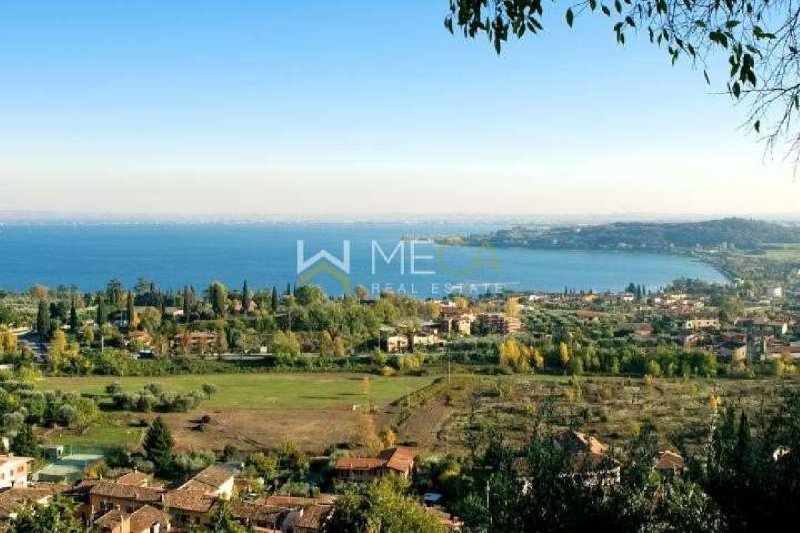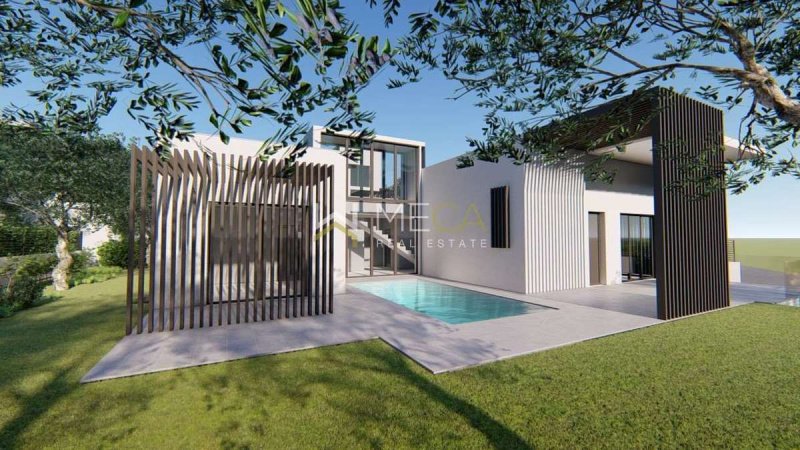Padenghe sul Garda, loc. Barcuzzi, new luxurious villa with lake view and swimming pool.
Completely independent and inserted in a context with five other villas, the villa is surrounded by a private planted garden and is built with refined design elements.
Structured on three levels:
ground floor with living area of over 50 square meters of floor space with bathroom, connected to the sleeping area via a passageway made entirely of glass overlooking the exterior and swimming pool, in which we find two spacious bedrooms and another bathroom;
first floor with master bedroom, bathroom, walk-in closet and access to a 60 sqm walkable terrace with complete lake view.
Both the living area and the sleeping area are characterized by the presence of several glass walls, which guarantee exceptional views and brightness.
Basement with 105 sqm garage, bathroom and further rooms that can be used as a gym, wellness area, tavern or other.
Maximum energy class A4, contemporary technology.
Lake Garda
Lake Garda or Benaco is the largest Italian lake, with an area of about 370 km² (third by depth after Como and Maggiore). A hinge between three regions, Lombardy (province of Brescia), Veneto (province of Verona), Trentino-Alto Adige (province of Trento), it is placed in parallel with the Adige, from which it is divided by the Monte Baldo massif. To the north it is narrow and funnel-shaped while to the south it widens, surrounded by moraine hills that make the landscape sweeter. The lake is an important tourist destination and is visited by millions of people every year.
In Roman times the lake was known as Benacus and by some it was revered as god Benacus, the very personification of the lake, sometimes associated with the cult of the god Neptune. Today it is better known as Lake Garda, a toponym attested since the Middle Ages and of Germanic origin, deriving from that of the homonymous town on the Veronese shore of the lake, which, together with another famous locality of the lake, Gardone Riviera, and others less known, such as Gàrdola, Gardoncino, Gardoni, Guàrdola and Le Garde, testifies to the Germanic presence that goes from the sixth to the eighth century, in particular the Lombard one. The toponym Garda, with which the lake is already called in some documents of the eighth century, is the evolution of the Germanic word warda, or "guard place" or "place of observation". The classic toponym of the lake, or Benācus lacus (Benaco), is almost certainly of Celtic origin, thus prior to Roman rule, and should derive from bennacus, comparable with the Irish bennach, and would mean "horned", or from the many promontories. The translation "horned" is also interpreted in reference to the Sirmione peninsula.
自动翻译所用的语言
Padenghe sul Garda, loc. Barcuzzi, nuova lussuosa villa con vista lago e piscina.
Completamente indipendente e inserita in un contesto con altre cinque ville, la villa è circondata da un giardino privato piantumato ed è realizzata con elementi di design ricercati.
Strutturata su tre livelli :
piano terra con zona giorno di oltre 50 mq calpestabili con bagno, collegata alla zona notte tramite passaggio realizzato completamente in vetro con affaccio su esterni e piscina, nella quale troviamo due camere spaziose e ulteriore bagno;
piano primo con camera padronale, bagno, cabina armadio e accesso su terrazza di 60 mq calpestabili con completa vista lago.
Sia la zona giorno che la zona notte sono caratterizzate dalla presenza di diverse pareti vetrate, le quali garantiscono una vista e luminosità eccezionali.
Piano interrato con garage di 105 mq, bagno e ulteriori vani che possono essere adibiti a palestra, zona wellness, taverna od altro.
Classe energetica massima A4, tecnologia contemporanea.
Il lago di Garda
Il lago di Garda o Benaco è il maggiore lago italiano, con una superficie di circa 370 km² (terzo per profondità dopo Como e Maggiore). Cerniera fra tre regioni, Lombardia (provincia di Brescia), Veneto (provincia di Verona), Trentino-Alto Adige (provincia di Trento), è posto in parallelo all'Adige, da cui è diviso dal massiccio del monte Baldo. A settentrione si presenta stretto a imbuto mentre a meridione si allarga, circondato da colline moreniche che rendono più dolce il paesaggio. Il lago è un'importante meta turistica ed è visitato ogni anno da milioni di persone. In epoca romana il lago era conosciuto come Benacus e da alcuni era venerato come dio Benacus, personificazione stessa del lago, talvolta associata al culto del dio Nettuno. Oggi è meglio noto come lago di Garda, toponimo attestato fin dal Medioevo e di origine germanica, derivante da quello dell'omonima cittadina sulla sponda veronese del lago, la quale, insieme a un'altra località celebre del lago, Gardone Riviera, e altre meno conosciute, come Gàrdola, Gardoncino, Gardoni, Guàrdola e Le Garde, testimonia la presenza germanica che va dal VI all'VIII secolo, in particolare quella longobarda. Il toponimo Garda, con il quale è chiamato il lago già in alcuni documenti dell'VIII secolo, è l'evoluzione della voce germanica warda, ovvero “luogo di guardia” o “luogo di osservazione”. Il toponimo classico del lago, ovvero Benācus lacus (Benaco), è quasi sicuramente di origine celtica, precedente quindi al dominio romano, e dovrebbe derivare da bennacus, confrontabile con l'irlandese bennach, e significherebbe “cornuto”, ovvero dai molti promontori. La traduzione “cornuto” viene anche interpretata in riferimento alla penisola di Sirmione.
CLASSE ENERGETICA:
Padenghe sul Garda, loc. Barcuzzi, neue Luxusvilla mit Seeblick und Swimmingpool.
Völlig unabhängig und in einen Kontext mit fünf anderen Villen eingefügt, ist die Villa von einem privaten bepflanzten Garten umgeben und mit raffinierten Designelementen gebaut.
Strukturiert auf drei Ebenen:
Erdgeschoss mit Wohnbereich von über 50 Quadratmetern Wohnfläche mit Bad, verbunden mit dem Schlafbereich über einen komplett verglasten Durchgang mit Blick auf den Außenbereich und den Pool, in dem wir zwei geräumige Schlafzimmer und ein weiteres Badezimmer finden;
erste Etage mit Hauptschlafzimmer, Badezimmer, begehbarem Kleiderschrank und Zugang zu einer 60 qm großen begehbaren Terrasse mit komplettem Seeblick.
Sowohl der Wohnbereich als auch der Schlafbereich zeichnen sich durch mehrere Glaswände aus, die eine außergewöhnliche Aussicht und Helligkeit garantieren.
Keller mit 105 qm großer Garage, Bad und weiteren Räumen, die als Fitnessstudio, Wellnessbereich, Taverne oder anderes genutzt werden können.
Maximale Energieklasse A4, zeitgemäße Technik.
Gardasee
Der Gardasee oder Benaco ist der größte italienische See mit einer Fläche von etwa 370 km² (drittgrößter See nach Como und Maggiore). Als Scharnier zwischen den drei Regionen Lombardei (Provinz Brescia), Venetien (Provinz Verona) und Trentino-Südtirol (Provinz Trient) liegt es parallel zur Etsch, von der es durch das Monte-Baldo-Massiv getrennt ist. Im Norden ist es schmal und trichterförmig, während es im Süden breiter wird und von Moränenhügeln umgeben ist, die die Landschaft verschönern. Der See ist ein wichtiges Touristenziel und wird jedes Jahr von Millionen Menschen besucht.
In der Römerzeit war der See als Benacus bekannt und von manchen wurde er als Gott Benacus verehrt, die Personifikation des Sees, der manchmal mit dem Kult des Gottes Neptun in Verbindung gebracht wird. Heute ist es besser bekannt als Gardasee, ein seit dem Mittelalter bezeugter Ortsname germanischen Ursprungs, der sich von dem gleichnamigen Ort am veronesischen Ufer des Sees ableitet, der zusammen mit einem anderen berühmten Ort des Sees, Gardone Riviera, und andere weniger bekannte, wie Gàrdola, Gardoncino, Gardoni, Guàrdola und Le Garde, zeugen von der germanischen Präsenz, die vom 6. bis zum 8. Jahrhundert reichte, insbesondere der lombardischen. Der Ortsname Garda, mit dem der See bereits in einigen Dokumenten des 8. Jahrhunderts bezeichnet wird, ist eine Weiterentwicklung des germanischen Wortes warda, was „Wachplatz“ oder „Ort der Beobachtung“ bedeutet. Der klassische Ortsname des Sees, oder Benācus lacus (Benaco), ist mit ziemlicher Sicherheit keltischen Ursprungs, also vor der römischen Herrschaft, und sollte von bennacus abgeleitet sein, vergleichbar mit dem irischen bennach, und würde „gehörnt“ oder „von den vielen“ bedeuten Vorgebirge. Die Übersetzung „gehörnt“ wird auch in Bezug auf die Halbinsel Sirmione interpretiert.


